Table of Contents

Unit 2: Teamwork
Do you like to work and play with others?
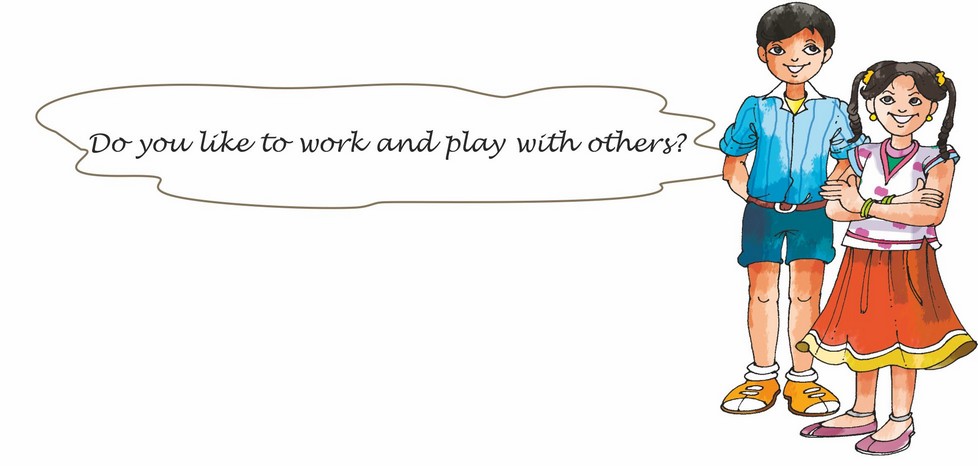

Let’s sing and dance
Teamwork, teamwork,
Together we can make our dream work.
Then we'll share the joy of what we've done,
Teamwork, everyone!
It's fun to shoot the basketball through the hoop,
But if nobody passes then nobody shoots.
And the relay race just can't go on,
If nobody wants to pass the baton.
We're the parts that make up the whole,
And we've got our eyes on a common goal.
Sometimes it can be a big plus,
When a you or a me becomes an us!
JAN NIGRO

New Words
Teamwork : combined effort of a group
hoop: (here) wooden or iron ring trundled along by child
passes : move onward
relay race : race between teams of which each person does part of the distance
baton : short tube or stick carried in relay race
Let’s Read
Complete the following sentences.
1. If nobody passes the ball in a basketball game, then you can’t _______________.
2. In a relay race, if no one passes the baton, then_____________________.
Think and Write
1. Name the team members needed for the following.
(i) To play cricket we need
batsmen, bowlers, fielders, coaches
(ii) To make a film we need
_________________________________
(iii) To run a good school we need
________________________________
(iv) To run a restaurant we need
_______________________________
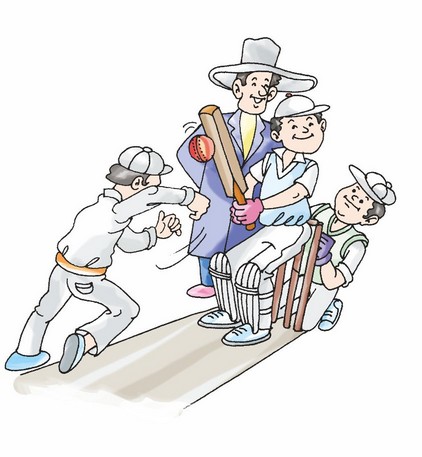
2. Complete the sets of rhyming words. One has been done for you.
Words from the poem | team | plus | done | hoop | shoot | goal | joy |
Your own words | beam |
3. Read the poem.
For want of a Nail
For want of a nail  the shoe
the shoe  was
was  lost,
lost,
For want of a shoe  the horse was lost,
the horse was lost,
For want of a horse  the rider
the rider  was lost,
was lost,
For want of a rider  the battle
the battle  was lost,
was lost,
For want of a battle  the kingdom
the kingdom  was lost,
was lost,
And all for the want of a horseshoe nail! 
Now form questions for the answers given in the speech bubbles.
Q _____
A. The shoe was lost because of the nail.
Q _____
A. The kingdom was lost because the battle could not be fought.
Q. _____
A. The battle was lost because there was no rider.
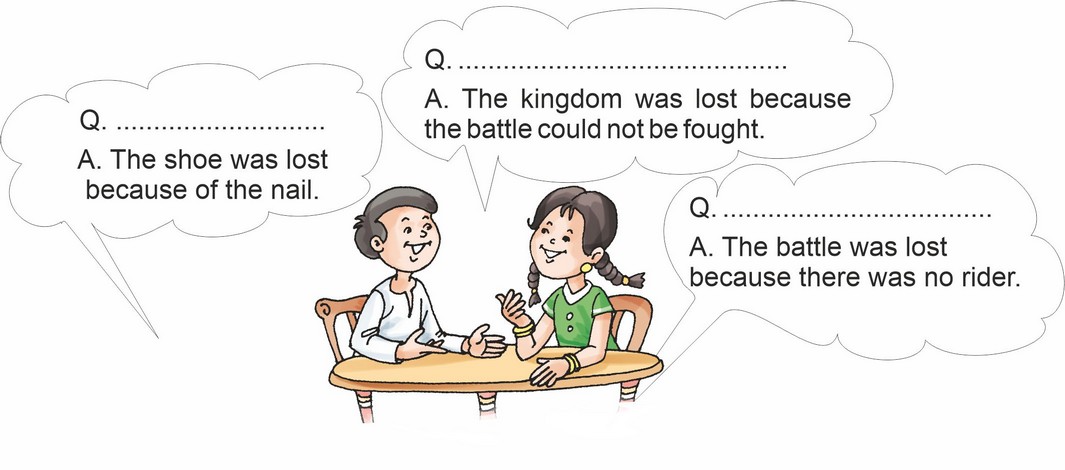
Now make three more questions and answers from the poem, Team work.
Q. _____
A. _____
Q. _____
A. _____
Q. _____
A. _____
Picture Composition
Look at the picture and answer the questions in one sentence, using the word clues given in the box.

plumber
painter
mason
electrician
labourer
carpenter
gardener
1. Who is laying the bricks?
_________________________________________
2. Who is holding the ladder?
_________________________________________
3. Who is the man on the ladder?
_________________________________________
4. Who is making the door?
_________________________________________
5. Who is painting the walls?
_________________________________________
Now make up a story about the picture. Give names to the people. Write the story showing the importance of teamwork.
Let’s Talk
1. In groups of five, discuss what you enjoy doing alone and what you like doing in a group.

Now prepare a list as shown below.

Things I like doing alone | Things I like doing in a group |
2. In your family, what activities are done individually and as a group?
My father decides _____.
My mother decides _____.
I decide _____.
We decide _____.

3. In a group, mime an activity (picnic, fair/mela, cricket match etc.) which you enjoy. The rest of the class should guess the activity and say whether it is done in a group/alone.
Let’s Write
1. In the puzzle find the words given in the column. Notice that these words are formed by joining two words. One is done for you.
Find some more such words.
sometime | a | c | h | g | m | k | e | v | e | r | y | o | n | e | m | f | S |
everyone | b | c | d | e | g | l | n | m | p | r | s | u | v | x | n | l | s |
basketball | a | b | t | e | a | m | w | o | r | k | f | g | i | l | o | w | u |
nobody | s | m | b | c | e | g | l | m | p | r | s | u | v | x | b | t | n |
teamwork | k | b | s | o | m | e | t | i | m | e | u | g | v | n | o | r | d |
baton | e | m | b | c | m | w | m | p | r | q | x | z | w | r | d | q | a |
t | q | w | b | a | b | s | t | a | n | d | b | y | c | y | p | y | |
b | a | c | a | d | e | f | g | h | i | j | k | l | m | p | s | r | |
a | m | b | t | e | t | m | e | c | a | n | p | o | t | x | b | t | |
l | f | g | o | h | c | n | p | t | n | s | u | w | d | a | x | f | |
l | z | w | n | x | y | v | h | a | y | d | s | o | m | e | u | s |
2. Let's write a poem.
I have a kite but need a friend to fly it with,

I know a song but need someone to hear it,
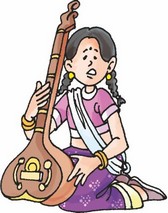
I have a ball but need someone to catch it,

Fun Time
Make groups of ten and present one of the following activities
in class.
skit song dance painting a chart for class
make paper bags from old newspaper
Say Aloud
1. We sometimes use short forms for some words. For example, we use for I am and for I have. These shortened words are called contractions.
2. The mark (‘) is an apostrophe which shows where the letters are left out. Now read together.
we will — we'll
cannot — can’t
we have — we’ve
you have — you've
there is — there’s
what have — what’ve
we are — we're
they are — they’re
1. Write the contractions for the following phrases.
has not _____
have not _____
do not _____
are not _____
2. Write the full forms for the following.
weren’t _____
she’ll _____
wasn’t _____
who’s _____
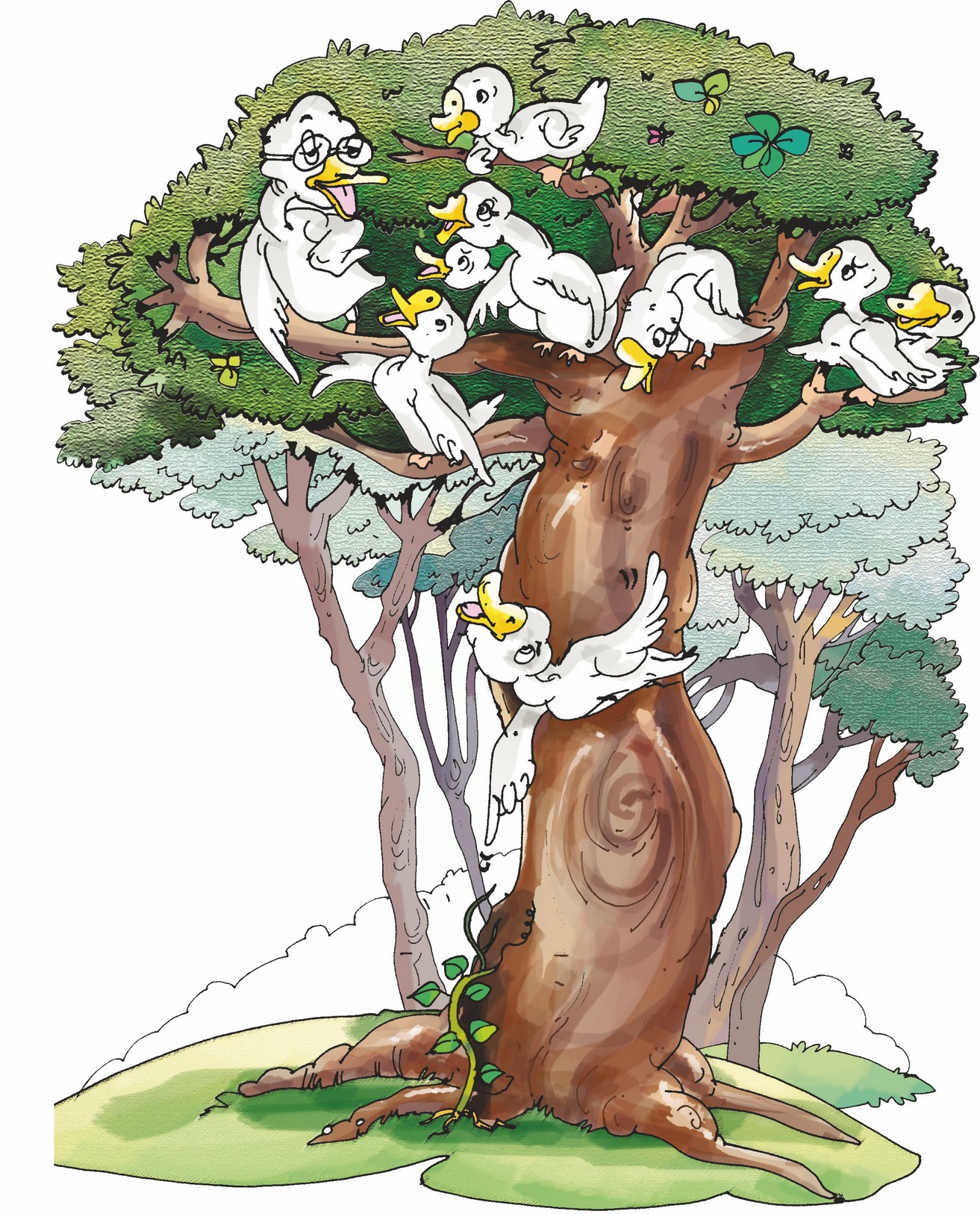
Flying Together
What are some of the things your parents and teachers tell you to do on time? ...Get up in the morning… do the homework…. pack your school bag...
What happened when you didn't do as they asked you to do?
Deep in a forest stood a very tall tree. Its leafy branches spread out like strong arms.
This tree was the home of a flock of wild geese.
They felt safe there. One of the geese was a wise old bird.
He noticed a small creeper at the foot of the tree. He spoke to the other birds about it.
“Do you see that creeper?” he said to them. “Let us destroy it”. “Why must we destroy it?” asked the geese in surprise. “It is so small. What harm can it do?” “My friends,” replied the wise old bird, “that little creeper will soon grow. As it creeps up this tree, it will become thick and strong.”
“What of that?” asked the geese. “What harm can a creeper do us?”
“Don't you see?” replied the wise bird, “with the help of that creeper, it will be possible for someone to climb this tree. A hunter can come up and kill us all.”
Trees and plants are to be conserved. Discuss in class and find out which plants, creepers or trees may be harmful for the existence of others.
“Well there’s no hurry,” they replied, “the creeper is very small. It would be a pity to destroy it now.”
“Destroy the creeper while it is still young,” the old bird advised. “Now it is tender and you can cut it easily. Later it will become hard and you will not be able to cut it.”
“We’ll see, we’ll see,” answered the birds. But they did not destroy the creeper.
They forgot the wise old bird’s advice. As the creeper grew, it began winding its way up the tree.
Stronger and stronger it became,until it was as strong as a thick rope.
One morning when the geese had gone out in search of food, a hunter came to the forest.
“So this is where the wild geese live,” he said to himself. “When they come back in the evening, I shall catch them.”
The hunter climbed up the tree with the help of the creeper. He got to the top and
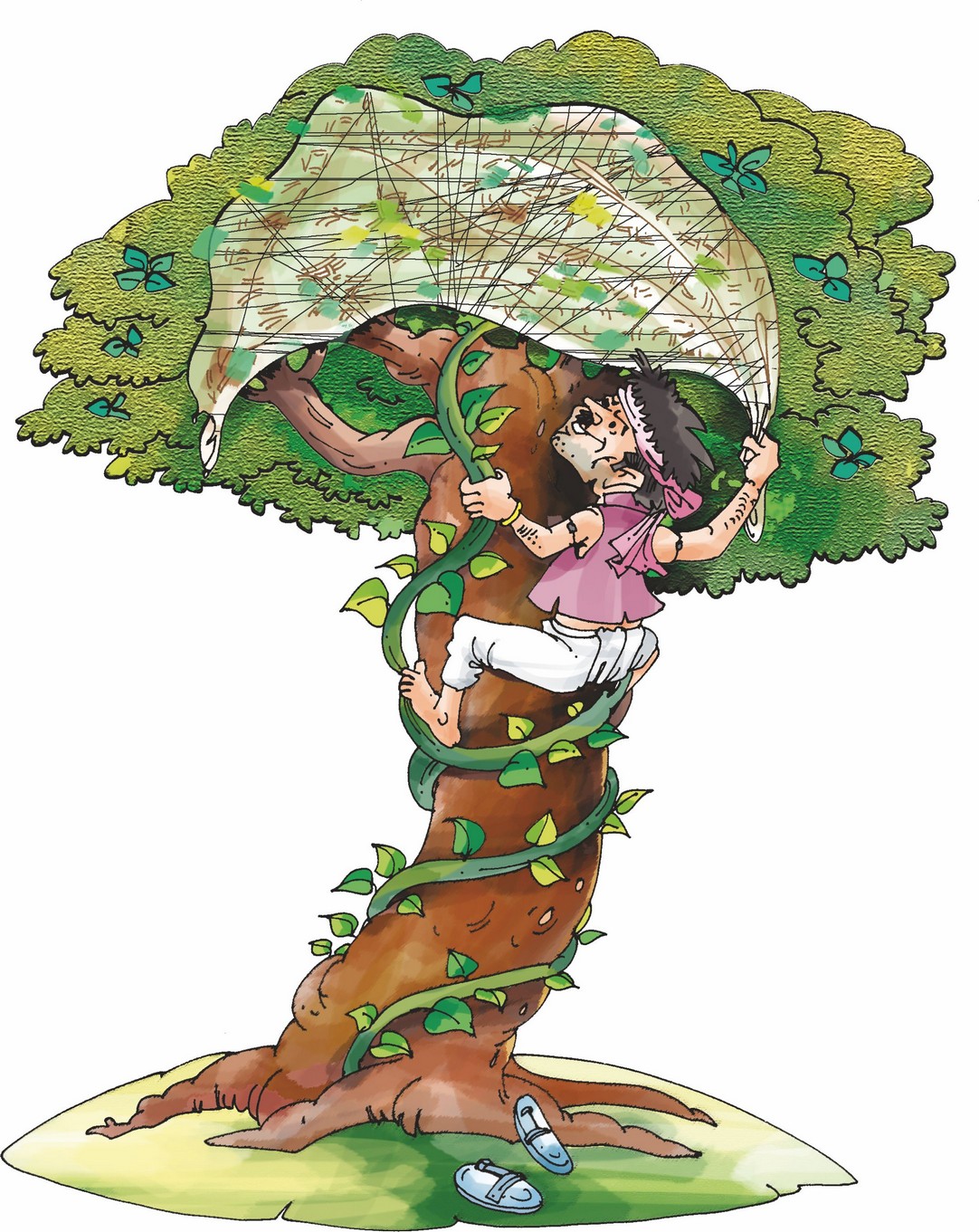
spread his net there. Then he climbed down and went away.
In the evening, the geese returned home. They did not notice the net. As they flew into the tree, they were trapped. They struggled hard to get out, but could not.
“Help! Help!” cried the geese. “We are caught in the hunter’s net. Oh! What shall we do?”
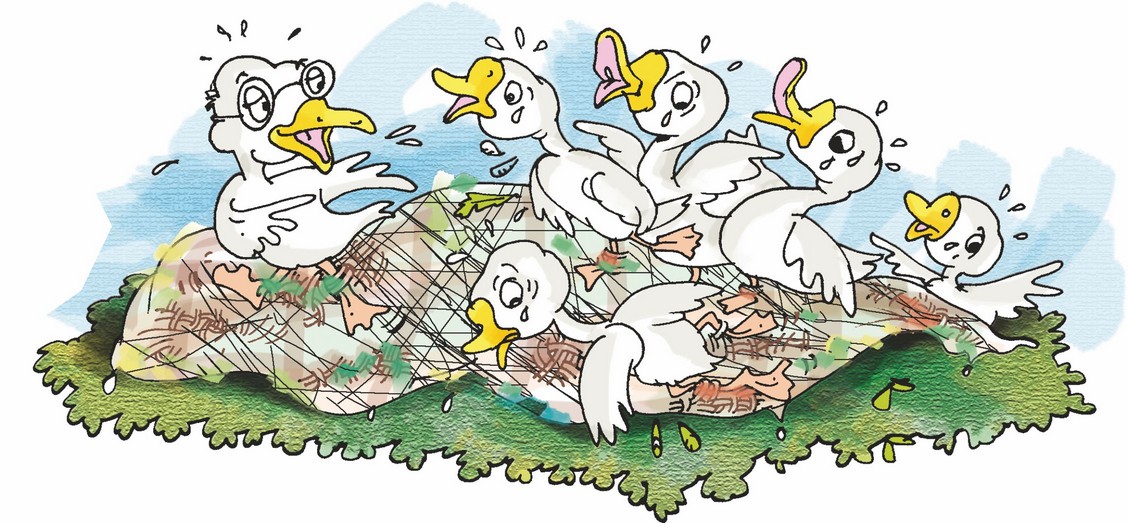
“Don’t make a fuss now,” said the wise old bird. “Long ago I told you to destroy the creeper, but you did not. Now see what has happened. Tomorrow morning the hunter will come back and kill us all.”
“We were foolish,” wept the birds. “We are very sorry we did not listen to you. Please tell us what to do?”
“Then listen carefully,” replied the wise bird. “When the hunter comes you must all pretend to be dead. Just lie still. The hunter will not want dead birds. He will throw us to the ground. It will then be easy for him to climb down, collect the dead birds, and take
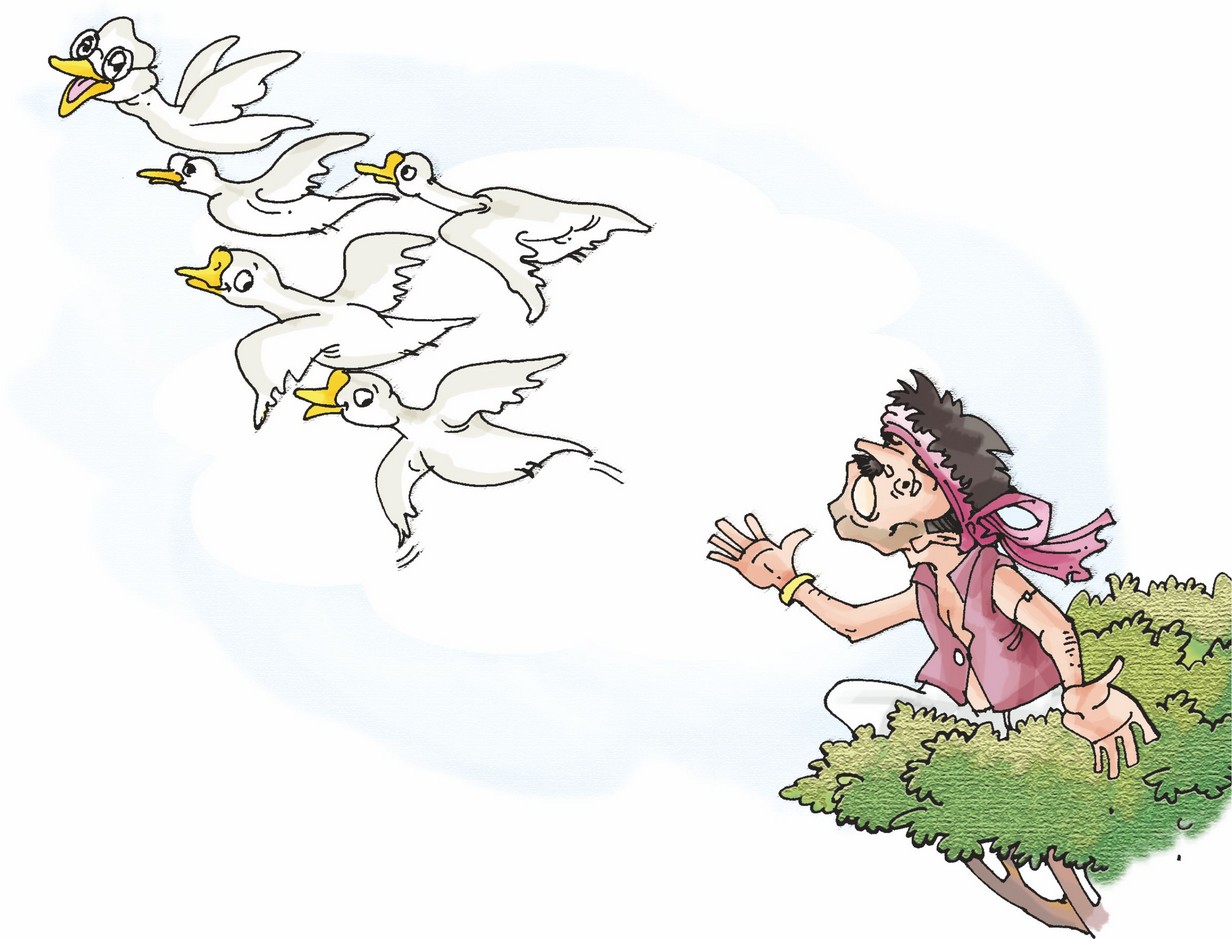
them home. When the last of us has been thrown down, we must quickly get up and fly away.”
In the morning the hunter came to the tree and climbed up. He looked at the geese in the net.
“They are all dead,” he muttered to himself. He threw them out of the net one by one. The birds lay still until the last one had been thrown down. Then, all at once, they got up, flapped their wings, and flew away.
The hunter was taken by surprise. From the top of the tree he watched all the geese fly away.
SHIV KUMAR
(Adapted from Stories from
Panchatantra – ‘A wise old bird’)
New Words
geese : plural for goose; large web-footed bird
creeper : plant that needs support to grow, usually along a wall or a tree
winding : go in circular, spiral course
muttered : spoken in a low tone
flapped : move wings up and down
Let’s Read
1. Where did the geese live?
2. Why did the old bird advise the other birds to destroy the creeper?
3. Why did the geese cry, “Help Help”?
4. What did the hunter do when he thought that the geese were dead?
5. Why did the geese pretend to be dead?
6. Describe one incident when you got into trouble because you did not do your work on time.
State whether the following statements are True or False.
1. The tree was the house of a flock of parrots.
__________________________________
2. The wise old bird wanted the creeper to be destroyed.
__________________________________
3. The hunter climbed the tree with the help of a ladder.
__________________________________
4. When caught in the net the foolish birds began to weep.
__________________________________
5. The wise old bird helped them to escape.
__________________________________
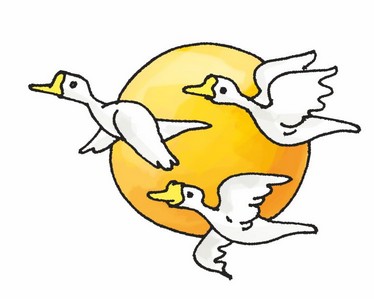
Let’s Listen
Listen to the following paragraph.
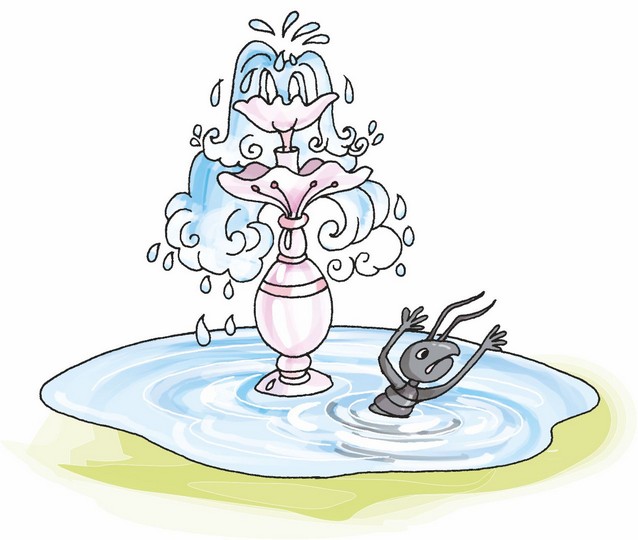
The Ant and the Dove
On his way home, an ant saw a sparkling fountain. He crawled on to its wall to take a closer look.
Suddenly he slipped and fell into the water. He gurgled and panicked and waved his legs in the air. “Help! I can't swim,” he cried. Luckily, just at that moment, a friendly dove flew by. She saw that the tiny ant was drowning and quickly flew to a nearby tree.
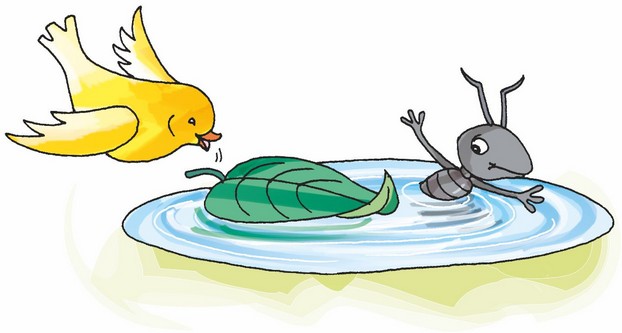
She pulled off a leaf and let it glide down to the ant. “Here you are,” she cooed, and flew away.
(Adapted from Aesop’s Fables)
(i) Why do you think the dove helped the ant?
(ii) How do you think the ant felt on finding the leaf?
(iii) Have you ever been in trouble like the ant? Did anyone help you?
Let's Talk
1.Work in pairs.
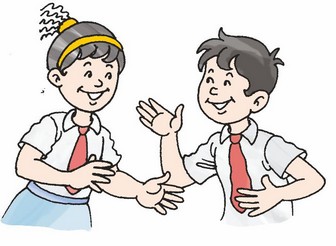
1. Ask your friend questions about all the things he does.
2. Use question words such as where, what, how, who, when, why. One is done for you.
Anu : I watch TV in the evening.
Amit : When do you watch TV?
Anu : I play games.
Amit : _________________
Anu : I collect stamps.
Amit : ________________
Anu : I play in the ground.
Amit : _______________
Anu : On Sunday I go shopping.
Amit : ___________________
2. Answer these questions about yourself.
(i) What is your name?
(ii) What languages do you speak?
(iii) How old are you?
(iv) Which is your favourite food?
(v) Where did you go yesterday?
(vi) Which country do you belong to?
(vii) When do you go to sleep?
(viii) Why do you drink milk?
3. In groups of five discuss what you would do if you were caught in the following situations.
1. Your friend falls in the play field and is hurt…
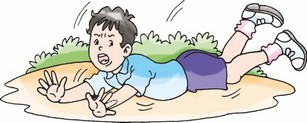
2. You are trapped in a fire...
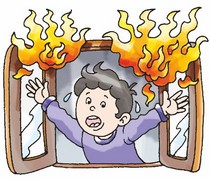
3. You are stuck in a traffic jam…
Let’s Write
1. The words in the clouds describe something or someone in the story. Name them in the blanks provided.
Make sentences of your own with the words given in the clouds.
1. wise _____
2. careless _____
3. thick and strong _____
4. foolish
5. tall _____
2. Here are some answers about the given picture.
(i) The colour of the ant is black.
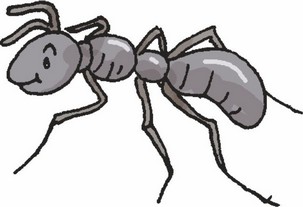
(ii) It lives on land.
(iii) It has two long antennae.
(iv) It crawls on the ground.
(v) It eats sugar.
Now frame questions for the above answers.
_________________________________________________
_________________________________________________
_________________________________________________
_________________________________________________
_________________________________________________
3. Fill in the blanks with prepositions such as to, at, off, on, in, into, with. One has been done for you.
(i) This tree was the home of a flock of wild geese.
(ii) He noticed the creeper _____ the foot of the tree.
(iii) “It would be a pity _____ destroy it now.”
(iv) As they flew _____ the tree they were trapped.
(v) The boy ran _____ the dog.
(vi) The frogs jumped _____ the well.
(vii) The girl was thrilled _____ see her new bicycle.
(viii) The birds were caught _____ the net.
(ix) The children walked _____ the bridge.
4. Complete the paragraph with suitable words from the box.
around
across
with
along
to
after
next to
into
from
One day, as I was walking _____ the bank of the river, I saw my friend running _____ the field. He was calling my name and waving _____ me. I stopped and waited. _____ sometime he reached where I was standing. He said, “I went all _____ the town looking for you. I have some exciting news to share you. Do you remember the old house _____ the neem tree? Guess who is moving _____ that house? Janak Das, the great magician. Now we can learn lots of magic tricks _____ him.”
5. Fill in the blanks given below with question words.
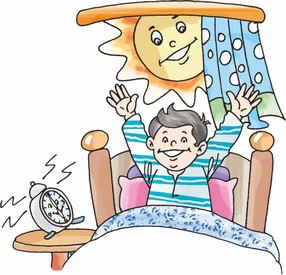
For example, do you live?
(i) ______ do you play?
(ii) ______ do you get up?
(iii) ______ do you have for breakfast?
(iv) ______ do you go to school?
(v) ______ do you like best in the school – games, art or music?
(vi) ______ is your birthday?
(vii) ______ do you want for your birthday?
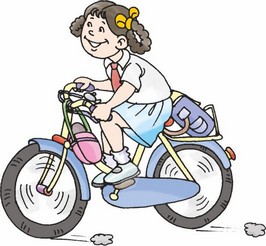
6. Reference to context.
1. “ Well there's no hurry, the creeper is very small, it would be a pity to destroy it now.”
2. “So this is where the geese live.”
Who said this? _____ _____
To whom was it said? _____ _____
When was it said? _____ _____
Draw pictures of the speakers of the above lines.
Fun Time
1. Proverbs are short, wise sayings. For example —Look before you leap. This means that we should think carefully before we take any action. Here are some popular English proverbs. Read them aloud together and discuss what each could mean.
1. Old is gold
2. As you sow so shall you reap
3. Unity is strength
4. United we stand divided we fall
4. A friend in need is a friend in deed
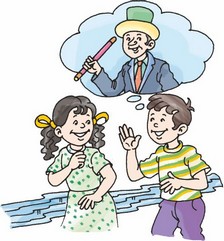
2. Look at this proverb: All's well that ends well.
(i) Discuss what it means. Can you think of events/ happenings in life where this proverb can be used?
(ii) Write down your story or the event. Then read the paragraph to your neighbour.
The clap word game
3. Let’s play the clap word game.
Where the word produces one sound, clap once, as in ‘creep’. Clap twice if the word can be broken up into two syllables as in cree-per, and thrice as in to-mo-rrow.
Creeper
Struggled
Tomorrow
geese
throw
foolish
possible
noticed
carefully
flapped
returned
evening
trapped
surprise
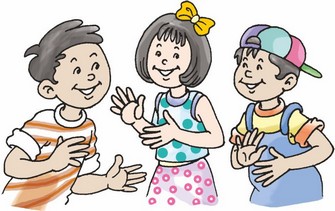
Teacher’s Page ________________________________________________UNIT 2
Poem : Teamwork
Story: Flying together
THEMES
Collaboration
Teamwork
Doing work on time
READING TIME
Help children experience the joy which comes from listening to good poetry. Let the class express how they feel about music. They can dance, tap their fingers, laugh, or sing poems. Explain to the class that listening to poetry is like listening to music. Poetry helps children sing inside themselves.
The stories of originally written in Sanskrit, are very old. Panchatantra depicts (wise conduct of life) through the medium of stories. The stories are mainly of animals, which children love to read. To enhance their reading habits the children must be encouraged to read more tales on their own. They can listen to stories from their grand parents and be asked to read some stories aloud to their friends. For purposes of language learning, listening needs to be encouraged with the help of music which includes folk, classical or popular compositions.
CONVERSATION TIME
The questions in the Let’s Talk exercise aim to develop the language and thinking skills of the child. Real life situations familiar to the child have been given so that he/she is able to identify with them. Every child should be given an opportunity to freely express himself/herself.
WRITING TIME
The child will make a list of activities he/she likes to do alone and in a group. They can share with the class which activities they enjoy more.
Working in pairs, the children will write five ways in which they think birds and animals are like human beings. E.g. Humans look after their young ones and so do animals and birds.
The picture writing exercise should be done after a discussion about the various people involved in building a house and also the different steps involved in building a house.
PROJECT WORK
Undertake a tree conservation drive to look after the plants in the school by watering them and weeding the area around them.
The students can also take up a campaign for keeping the school compound clean by collecting litter and throwing it into dustbins.